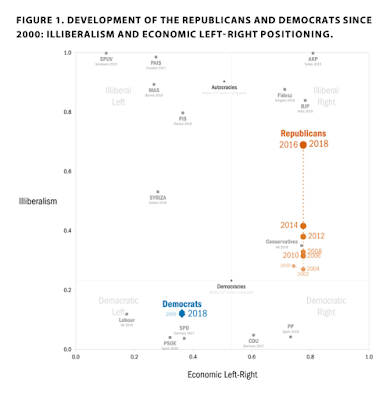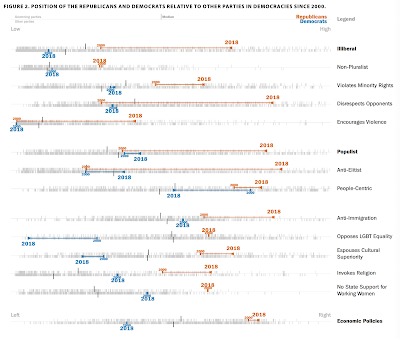
Many observers have raised concerns about the direction that American politics has taken in the past decade, and especially since the election of 2016. The concern is that conservatives in the United States, included elected officials and GOP leaders, have increasingly shown disregard for fundamental democratic values: the independence of the judiciary, the inviolable role in a democracy of a free press, the right of citizens to peacefully protest, and the right of all citizens to exercise their right to vote.
A recent study by the V-Dem Institute at the University of Gothenberg in Sweden (link) has given these concerns new urgency. V-Dem is a collaborative academic project involving a multinational group of social scientists, that is devoted to arriving at evidence-based assessments of the state of democracy in the world. Here is the V-Dem mission statement:
Varieties of Democracy (V-Dem) is a new approach to conceptualizing and measuring democracy. We provide a multidimensional and disaggregated dataset that reflects the complexity of the concept of democracy as a system of rule that goes beyond the simple presence of elections. The V-Dem project distinguishes between five high-level principles of democracy: electoral, liberal, participatory, deliberative, and egalitarian, and collects data to measure these principles.The Institute has released an important and evidence-based briefing paper reporting "New Global Data on Political Parties" (link) along with an annual report on the global status of democracy (link). The briefing paper provides very striking data about the transformation of US politics over the past several decades, and the findings are highly disturbing. Here are the summary findings:
- V-Party’s Illiberalism Index shows that the Republican party in the US has retreated from upholding democratic norms in recent years. Its rhetoric is closer to authoritarian parties, such as AKP in Turkey and Fidesz in Hungary. Conversely, the Democratic party has retained a commitment to longstanding democratic standards.
- This is a global trend: The median governing party in democracies has become more illiberal in recent decades. This means that more parties show lower commitment to political pluralism, demonization of political opponents, disrespect for fundamental minority rights and encouragement of political violence. (1)
The Illiberalism Index gauges the extent of commitment to democratic norms that a party exhibits before an election. It is the first comparative measure of the “litmus test” for the loyalty to democracy, which the famous political scientist Juan Linz developed in 1978, and Steven Levitsky and Daniel Ziblatt have propagated in their 2018 book on “How Democracies Die”. Indicators comprising the Illiberalism Index are low commitment to political pluralism, demonization of political opponents, disrespect for fundamental minority rights and encouragement of political violence. (1)
Notice the features that are measured in this index: low commitment to political pluralism, demonization of political opponents, disrespect for fundamental minority rights, and encouragement of political violence. These are the factors that are given greatest attention by Levitsky and Ziblatt in their analysis of the decline of democracies. Each of these features has been prominent in the Trump presidential election campaign -- including rallies and campaign stops in the state of Michigan, where a right-wing extremist plot to kidnap and harm the governor of the state was recently uncovered.

The graph represents the positions of a dozen or so parties in Europe and North America, on a Left-Right scale on the X-axis and the Illiberalism measure on the Y-axis. There are many important things to notice on this graph, but the most important is the progression of the Republican Party up the scale of Illiberalism between 2004 and 2018. This is a steady march towards anti-democratic values on the part of one of the major parties in the US democracy. By contract, the Democratic Party has a substantially lower Illiberalism value, and a score that has not changed appreciably. The Democratic Party shows a continuing support for democratic institutions and values, and the Republican Party does not. As the report notes, "the Republican Party scores much higher than almost all parties in democracies on almost all of these indicators" (1).
The features of the Illiberalism index are broken out in Figure 2 of the report:

Here again the data are unsurprising for anyone who follows the discourse of the Democratic and Republican parties in the United States. These measures show a massive change in Republican Party language with regard to "disrespects opponents", "encourages violence", "anti-immigration", and "espouses cultural superiority", and a substantial difference between the two parties on all the other measures as well.
(The data underlying these calculations of Illiberalism are available from the V-Dem institute.)
This report -- and the many books that have been published in the past few years about the decline of democracy -- forces us to ask several pointed questions.
First, why are senior elected officials (senators, congressmen and women, and the president and the vice president of the United States) willing to sacrifice these irreplaceable values and institutions of our democracy for short-term political expediency? Do they in fact care nothing for the values and institutions of our constitutional democracy? Do they not understand the terrible harm they are producing? Has Trumpism so completely corrupted the culture of the Republican Party that its leaders no longer stand for anything but their own power?
Second, what can be done to reverse these trends within the political culture of the United States? The situation is not beyond repair, and a variety of smart defenders of democracy have sought to imagine effective ways for citizens and social movements to defend our democracy and our institutions. One such effort is The Democracy Playbook: Preventing and Reversing Democratic Backsliding (link), published in 2019 by the Brookings Institution. Here is a good description by the authors of the anti-democratic process of erosion of democratic institutions and values:
Once in power, illiberal governments capitalize on popular support to deploy a discernible toolkit and a loosely predictable sequence to chip away at democracy and build an illiberal state. As argued in a related Brookings report, The Anatomy of Illiberal States, “Liberal principles—political ideas that espouse the importance of individual liberties, minority rights, and the separation of power across levers of government—and democratic institutions—processes that translate popular will into public policy through legitimate elections—are being pulled apart.” At times, their efforts extend beyond attacks on liberal principles to include delegitimizing political opposition, diminishing fundamental political rights to free speech, assembly and media plural- ism, and clamping down on civil society—all of which are indispensable for a functioning democracy. (9)To resist this process of right-wing populist authoritarianism, the authors suggest these ideas:
- Be prepared for and invest in protecting against internal and external interference in elections. Elections are the foundation of a democracy yet advances in digital technology have rendered elections increasingly complex and vulnerable to interference. Governments should have a proactive and comprehensive deterrence strategy—with responsible actors in clearly defined roles—that will appropriately punish nations who interfere in democratic elections. Governments and political parties should invest in the people and systems necessary for the technological security of election counting, voter registration machines, and political campaign networks.
- Enact policies that promote and protect broad access to the vote, such as automatic or same-day voting.
- Regulate the role of money in politics to retain trust in the democratic system through the creation of such mechanisms as public financing of campaigns, disclosure requirements for donations, and limits on the amount of campaign donations.
- Uphold institutional obligations and use their political power responsibly through “institutional forbearance” (i.e., politicians should refrain from using the full breadth and scope of their politically allocated power) and through “mutual toleration” (i.e., opposing sides regarding one another as legitimate rivals, but not enemies.) When these norms break down and authoritarian challenges emerge, further legal mechanisms should be considered to sanction extreme behavior.
- Defend the independence of the judiciary by establishing public procedures for the selection, appointment, and promotion of judges, for the allocation of cases to judges, as well as codes of ethical behavior that protect the integrity of the judicial decision-making process from undue political pressure, intimidation, and attacks.
- Implement judicial transparency mechanisms (e.g., opening up courtrooms, producing publicly available transcriptions of proceedings, and placing cameras in courtrooms).
